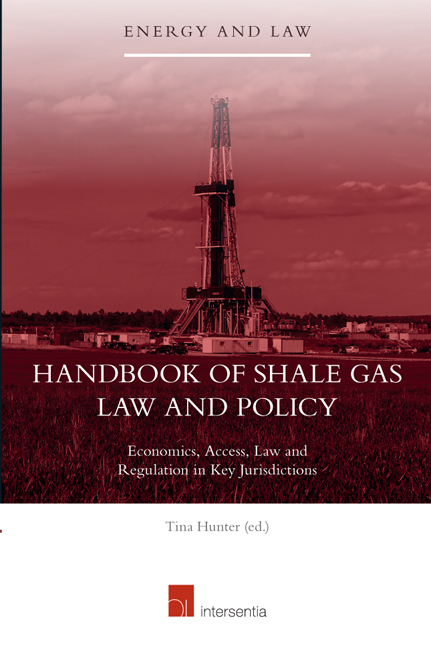Book contents
- Frontmatter
- Preface
- Contents
- List of Tables and Figures
- List of Authors
- Part I Overview and Introduction to Shale Gas Activities
- Part II Shale Gas Economics and Energy Security
- Part III Access to Shale Gas Resources
- Part IV Shale Gas Law and Regulation
- Regulating Hydraulic Fracturing
- Regulating Well Integrity
- The Environmental Challenges of Shale Gas Extraction
- An Overview of Shale Gas Law and Policy
- Shale Gas Law and Regulation in the United Kingdom
- Shale Gas Law and Regulation in North America
- Shale Gas Law and Policy in Australia
- Part V The Future of Shale Gas in the United Kingdom
- Index
Regulating Hydraulic Fracturing
from Part IV - Shale Gas Law and Regulation
Published online by Cambridge University Press: 21 September 2018
- Frontmatter
- Preface
- Contents
- List of Tables and Figures
- List of Authors
- Part I Overview and Introduction to Shale Gas Activities
- Part II Shale Gas Economics and Energy Security
- Part III Access to Shale Gas Resources
- Part IV Shale Gas Law and Regulation
- Regulating Hydraulic Fracturing
- Regulating Well Integrity
- The Environmental Challenges of Shale Gas Extraction
- An Overview of Shale Gas Law and Policy
- Shale Gas Law and Regulation in the United Kingdom
- Shale Gas Law and Regulation in North America
- Shale Gas Law and Policy in Australia
- Part V The Future of Shale Gas in the United Kingdom
- Index
Summary
INTRODUCTION
Significant interest prevails in virtually all continents to access the hydrocarbons in the deep shale basins and other unconventional resources such as coalbed methane (also known as coal seam gas), tight gas and basin-centred gas. Recent development of shale resources in North America has been extraordinary, but local factors including geological limitations, community viewpoints, political constructs, regulatory deficiencies, resource ownership, access to infrastructure and technology limitations have impeded the development of these resources in many other countries. Despite intense competition across the world, petroleum engineering has a very strong collegiate framework with the promotion of process safety, engineering standards and other aspects addressing the ubiquitous range of technical and environmental risks, through national and international organisations. Combined with strong interest by the larger majors in resource development wherever it may occur, such a framework has resulted in technically similar engineering standards and approaches in each continent, allowing for a degree of commonality with the regulatory elements. Each jurisdiction involved with unconventional resource development may have a number of agencies from central government, state/provincial government and local authorities managing diff erent aspects of the activities, but the target issues are overwhelmingly the same in respect of environmental protection and process safety. This chapter considers the principles of the regulation of shale gas extraction that have been implemented.
Environmental protection law for minerals development can be traced back as far as the 1783 Minerals Code for New Spain with specific prohibition (Chapter XIII, Section II) of the discharge of mine waters to streams used for public water supply. The enactment of regulations for hydraulic fracturing in the unconventional resources sector has largely been in catch-up mode in jurisdictions across the world due to the rapid expansion over the last 15 years, with the bulk of production activity across the North American basins. Despite the application of this technology to conventional oil and gas development, specific regulation dealing with hydraulic fracturing per se, was not particularly evident pre-2000; rather, critical aspects arising from its use were dealt with as part of the general regulatory toolbox dealing with petroleum development within each jurisdiction.
The legal history of hydraulic fracturing regulation in Alabama set a framework emulated in many other states of the US.
- Type
- Chapter
- Information
- Handbook of Shale Gas Law and PolicyEconomics, Access, Law and Regulation in Key Jurisdictions, pp. 189 - 212Publisher: IntersentiaPrint publication year: 2016
- 1
- Cited by



